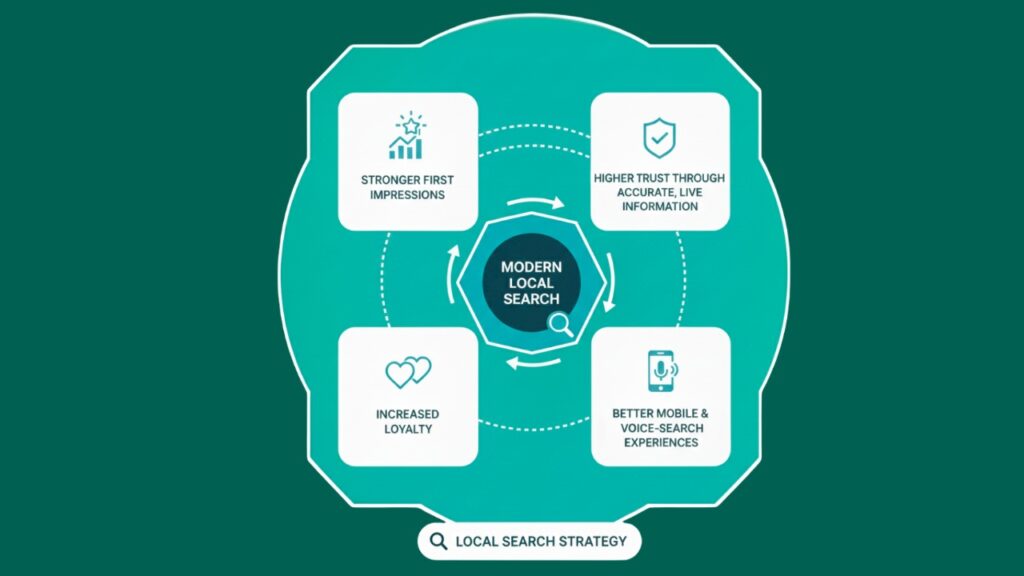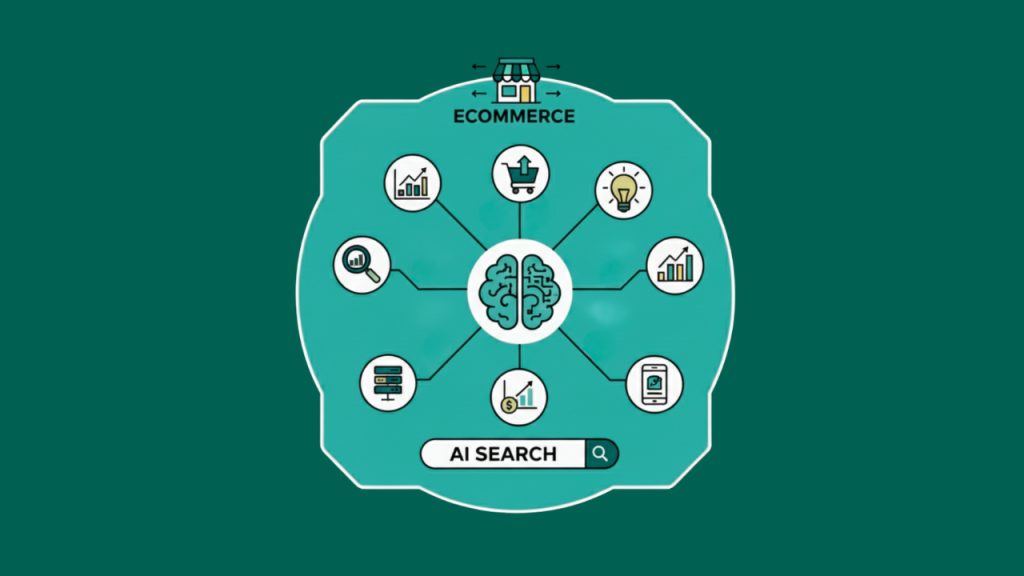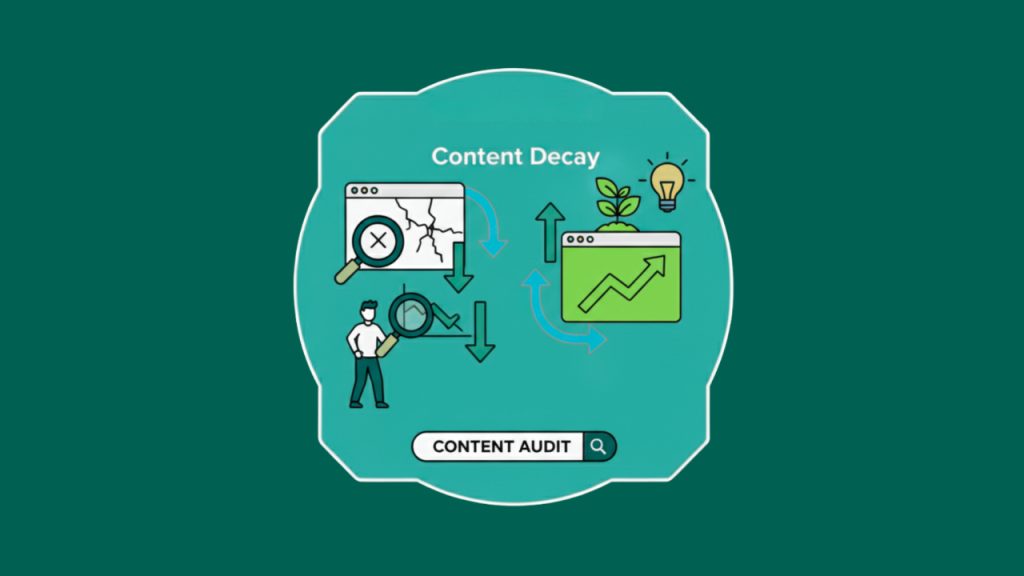Search is changing. Years ago, most people typed broad terms like “best coffee shop” or “shoe store online.” Today, search has become local. People now want results near them that are fast, accurate, and personal. This change has pushed businesses to adapt to location-based search. The question is: are you ready for it?
This is the New Era of Search Visibility. It is no longer just about ranking for any keyword. It is about showing up when customers in your area look for services you provide. According to Search Engine Land, 46% of all Google searches have local intent. That means almost half of searches connect directly to local businesses.
In this blog, we will explore what this new era means. We will break down local SEO strategies, geo-targeted search optimisation, and practical steps you can take. By the end, you’ll know how to improve your local search marketing and attract more customers.
Table of Contents
Understanding the New Era of Search Visibility
Location is the only thing that matters in the New Era of Search Visibility. People don’t only want “a product.” They want “that product close to me.” Companies that adjust to this change stand out. People who don’t take risks cannot be seen.
Now, search engines use things like GPS, maps, and local directories. Instead of providing results from all around the world, they show possibilities that are close by. This makes sense. You don’t want a pizza place 200 miles away if you’re hungry. You want the one that lives on your block.
This time period shows a shift from broad SEO to location-based search. That’s where geo-targeted search optimisation comes in. This is a chance for local businesses to compete. You don’t need a huge budget to attain a high national ranking now. You can get the clients who are most likely to visit by focusing on your local location.
According to Search Engine Roundtable, 46% of all Google queries are for local information. This highlights the importance of planning with local SEO in mind.
Key Factors Affecting Local Search Rankings
There is a reason for local rankings. Search engines like Google pay attention to clear signs. You need to get really good at these things if you want to get better.
Google Business Profile Optimisation
Your Google Business Profile (GBP) is like a digital store for your business. It tells others who you are, what you do, and where you are. Completing your profile fully is critical. Include your address, phone number, business hours, and pictures. Check your listing to build trust.
Having an exact GBP helps your local search marketing. It’s easy for customers to find you. They can also get in touch with you without going to your website. A well-done profile looks professional.
Reviews and Ratings
Reviews are really strong. People trust them almost as much as recommendations from friends and family. Reviews are another aspect that Google utilises to rank sites. More good ratings mean more people will see it.
Get feedback from clients after they leave. Answer reviews, whether they are nice or terrible. It demonstrates that you care. Review signals might help you move up in local search results. They also gain the trust of new clients.
Local Citations and NAP Consistency
Citations are mentions of your business in directories and sites. Yelp, the Yellow Pages, and local chambers of commerce are all examples. Your Name, Address, and Phone Number (NAP) should be in every citation.
Being consistent is very important. Google gets confused when your information is different on multiple platforms. Data that isn’t consistent makes people less likely to believe it. Make sure that all of your business information is the same. This minor measure makes search visibility trends better.
Localised Content
Content is still king, but it needs to be local. Include your city or area in your blog posts or service websites. Instead of “plumbing services,” you may say “plumbing services in Birmingham.”
Localised content helps search engines find your business when people search for things in your area. It also makes people feel like they know your brand. People like businesses that talk to their community.
Geo-Targeted Marketing Strategies
Want to stand out in your city or town? Geo-targeted strategies are your path forward. Let’s explore how to apply them.
Using Geo-Specific Keywords
Keywords shape how people find you. Adding city or region names makes them powerful. Instead of “dentist,” aim for “dentist in Chester.”
Research terms using Google Keyword Planner or local tools. List phrases customers use in your area. Add them to your website, headings, and metadata. This is the base of geo-targeted search optimisation.
Mobile Optimisation for Local Search
Most local searches happen on smartphones. If your site is slow or hard to use on mobile, you lose customers. A mobile-friendly design keeps users engaged.
Check if your site loads fast. Buttons should be easy to tap. Fonts must be clear. Mobile optimisation is not an option. It is a must for digital marketing for local businesses.
Local Link Building & Partnerships
Links from local sites increase credibility. Collaborate with nearby shops or groups. Sponsor events, join business networks, or guest post on local blogs.
These efforts build connections and backlinks. Both strengthen your authority in local search. Partnerships also spread your name in the community.
Structured Data and Schema Markup
Schema markup helps search engines understand your content. For local SEO, this includes your location, hours, and services.
Adding schema boosts your chances of showing in rich results. This may include maps, reviews, or FAQs in search. It makes your listing stand out.
Tracking and Measuring Local Search Success
How do you know if your local SEO is working? Tracking is the answer.
Use Google Analytics to see traffic from local searches. GMB Insights shows how people find your profile. Both tools give you clues about what works.
Important KPIs include:
- Click-through rates.
- Phone calls from your profile.
- Map views and directions requests.
Measuring these helps refine your local SEO strategies. It also shows the real value of your digital marketing efforts.
Emerging Trends in Geo-Targeted Search
The way people search is continually changing. These are the most recent trends in search visibility that will shape the future.
Voice Search for Local Queries
“Hey Google, what’s the closest gym?” Voice search is becoming increasingly popular. People talk and type in different ways. They ask full inquiries.
Add conversational terms to your material to make it better. Use normal language and FAQs. This makes it easier for people to find your site when they search with their voice.
Hyper-Local Advertising
Hyper-local ads only show up for people in a tiny area, such as a few streets. This is perfect for stores, events, or services that need to be done right now.
You may define radius targeting on platforms like Google Ads and Facebook. Companies can now get in touch with people at the correct time and location.
AI-Driven Search Personalisation
AI is changing how results look. Search engines may now guess what you want based on what you do. Google may offer you neighbouring cafés before you finish typing if you always look for them.
AI-driven customisation makes local search marketing more accurate. To change, make sure your information is useful and easy to utilise.
Challenges Businesses Face in Local SEO
Local SEO has huge benefits, but it is not without challenges. Let’s explore common roadblocks.
Competition in Saturated Markets
Big cities have hundreds of similar businesses. Standing out can be tough. You need smart keyword targeting and unique content. Adding reviews, visuals, and local links can give you an edge.
Maintaining Up-to-Date Information
Business information often changes, including hours, phone numbers, or addresses. Not keeping them up to date destroys trust. Make sure all profiles are up to date. This easy step keeps things clear.
Collecting and Managing Online Reviews
Some companies have a hard time getting reviews. Some people are afraid of the bad ones. But reviews are crucial. Make the procedure easy. Ask politely, maybe via email or at checkout.
Respond with care to bad reviews. A professional reply can turn a critic into a loyal customer.
Final Thoughts
The New Era of Search Visibility has transformed how digital marketing works. Businesses can’t just use generic SEO anymore. To do well, they need to use location-based methods.
Features like a clear Google Business Profile and local keywords help your business show up more in search results. Analytics help you stay on track by keeping an eye on your progress.
Trends like voice search, hyper-local advertisements, and AI-driven customisation are changing the way people search. There are problems, but those who stay up to date will do well.
It is time to invest in local SEO. Ensure your information is accurate, tailor your content to the local audience, and make it mobile-friendly. This will help you get more consumers, stay ahead in the new digital world, and increase your visibility.
At Midland Marketing, we help businesses flourish by using clever digital techniques. Our team knows how to make local SEO work for you. We can help you with rankings, calls, or just build your brand in your community. Our team will help you every step of the way.
Get in touch with us immediately to build your path to lasting visibility.
Frequently Asked Questions (FAQs)
1. How do Local SEO strategies help my business?
They help your business rank higher in local results. This brings more foot traffic, calls, and sales.
2. What is geo-targeted search optimisation?
It is the practice of tailoring your site and keywords for a specific city, town, or area. This makes your business more visible to nearby customers.
3. Why are reviews important in local SEO?
Reviews build trust. Search engines also use them as signals for rankings. More good reviews mean more visibility.
4. What tools should I use to track local SEO success?
Google Analytics, Google Business Profile Insights, and keyword trackers are the most useful.












